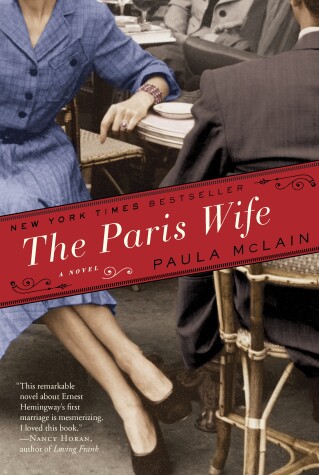Reviewed by lovelybookshelf on
I am a fan of Hemingway's writing, especially his short stories, but I didn't know much about his life prior to reading The Paris Wife. I started to feel annoyed by the narration. Phrases such as "later his parting remarks would come back to me sharply," "it was one of those domino moments," "we wouldn't look this way for long," and "that would eventually set off an entire series of events" were often placed at the end of sections, spoiling the pleasure I'd normally get from discovering the story as it unfolds. I'm sure in later chapters I would have recognized the impact of those previous scenes. I didn't like reading huge hints (in my eyes, spoilers) about what was going to happen.
There were also times when wonderfully written interaction between characters could have stood completely on its own. In these passages, I knew that I must be feeling how Hadley must have felt. And then McLain would shatter those lovely moments she had recreated by immediately spelling out exactly what those feelings were. Just in case the reader didn't get it the first time. This interrupted the flow of the story for me. I agree with Hemingway when he says in chapter 39, "It's what I've always said about the stories, that you get by with as little explanation as possible. It's all there already or it's not. The exposition slows it and ruins it."
However, that wasn't enough to make me give up on the book. I loved how McLain brought me into their world. The slang, the hairstyles and dress, their way of life, things they did for entertainment, their friends and acquaintances (F. Scott and Zelda Fitzgerald, Gertrude Stein, and so many others); thanks to these detailed glimpses into bohemian life in 1920's Paris, I felt as if I was there. McLain captures the struggles of the post-war "Lost Generation" with gentle honesty. Hadley says in the prologue, "Not everyone believed in marriage then. To marry was to say you believe in the future and in the past, too - that history and tradition and hope could stay knit together to hold you up. But the war had come and stolen all the fine young men and our faith, too." Although Hadley and Hemingway's relationship was often tumultuous, I was struck by their love for each other and their honest attempt at marriage despite the attitudes and feelings among their peers.
I'm glad I followed through with this book until the end, and I enjoyed much of it, but it isn't one I'd read again.
Reading updates
- Started reading
- 18 January, 2013: Finished reading
- 18 January, 2013: Reviewed
